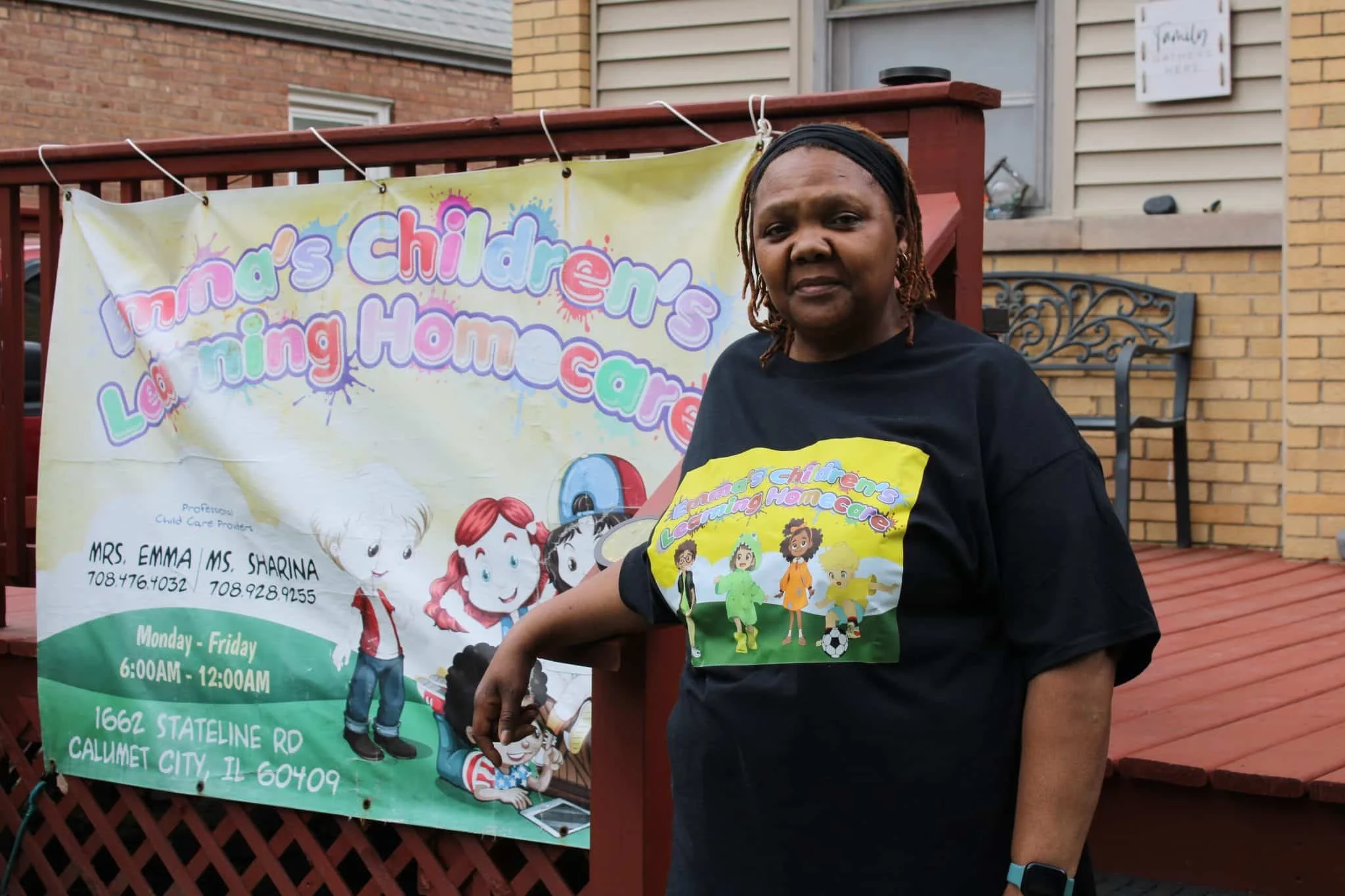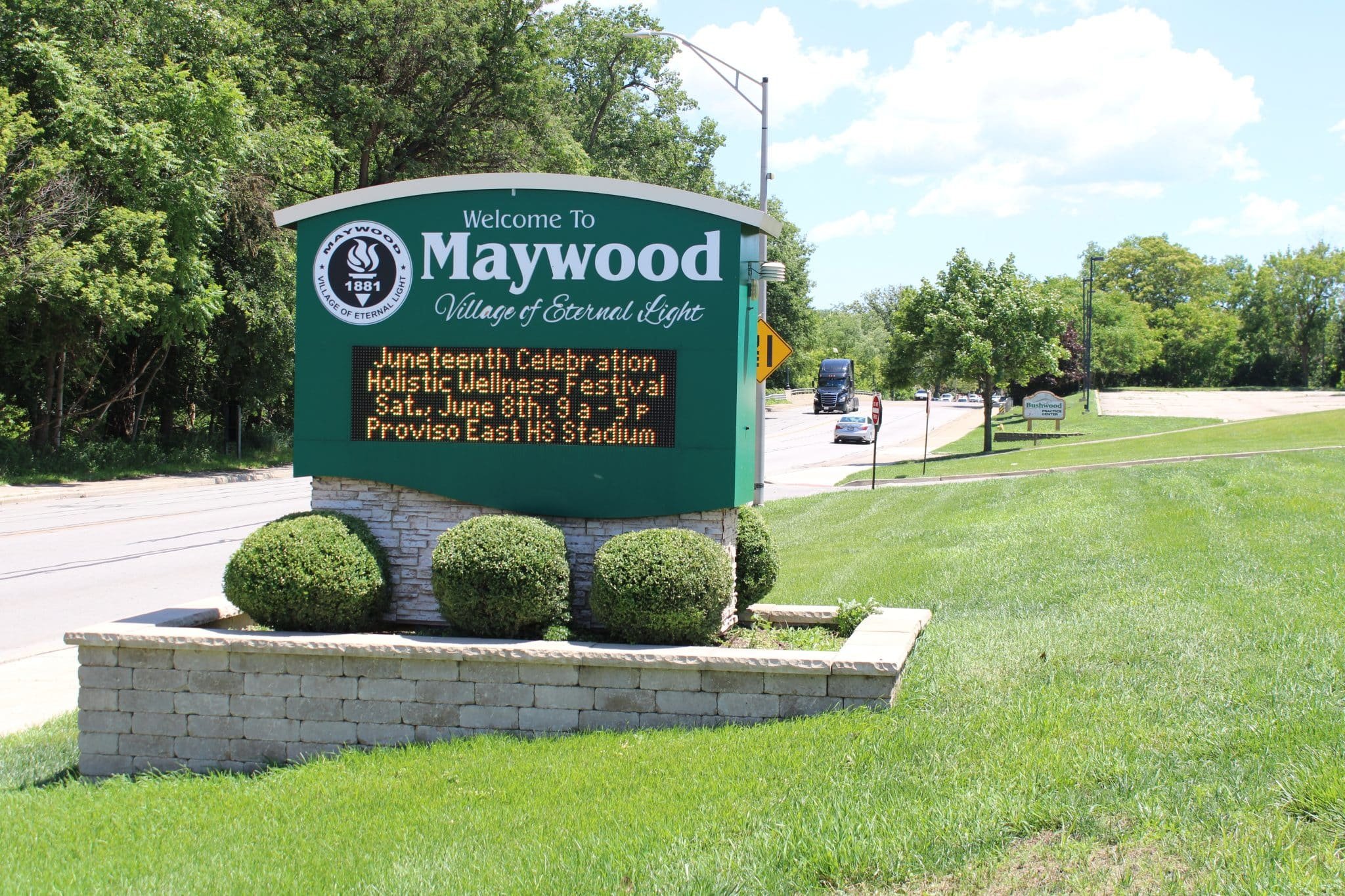Cook County LeadCare program restores trust in tap water use
Emma Jefferson is the owner of a home-based childcare provider in Calumet City. She previously struggled with corrosion of lead pipes, but a new Cook County program replaced them for free. HWH / Amethyst J. Davis
This story was originally published by the Harvey World Herald on Jun 9, 2024.
When home-based daycare provider Emma Jefferson moved to Calumet City in 1999, she quickly learned that she couldn’t trust the water.
“When I first turned on the faucet, the water was thick and brown, so I had to let it run before I could use it,” Jefferson said.
The magnitude of the problem is statewide. According to Anne Evans, CEO of Elevate, an equity environmental non-profit, Illinois has the largest number of lead service lines in the country, and the bulk of them are in Cook County.
For 25 years, Jefferson relied on bottled water for drinking and cooking, and has filters on all faucets, shower heads included. To maintain her status as a licensed daycare provider, the State of Illinois requires that all centers annually test their water for lead and submit the results to the Department of Children and Family Services (DCFS). “[Some time ago] my pipes were messing up, and I had a plumber take one of the pipes loose,” Jefferson said. “He showed me that it was full of all types of corrosion.”
Typically, line replacements can cost between $13,000-$20,000, depending on how many lines require replacement, according to Bethany Olson, Program Manager of Water Programs at Elevate. But thanks to LeadCare, a new suburban Cook County initiative to replace lead water service lines for all home based and daycare centers, it’s free.
County and federal partner to address lead service lines
LeadCare funding was made possible by the American Rescue Plan Act (ARPA), and is part of a $15 million countywide initiative to replace lead water service lines. Cook County partnered with Elevate as the primary project manager for the program. The process, from start to finish, can range from one to three months, with actual replacement lasting one to two days.
Cook County Commissioner Monica Gordon (5th) whose district includes Harvey, Markham, Riverdale, and surrounding Southland municipalities, insisted that this program “focuses on areas with the most need. When you talk about life expectancy and the difference across zip codes, and other inequities, it’s always based on where you are.”
Pilot phase communities were selected based on key criteria such as low property taxes, household income, and sheer number of daycare centers. “We put resources in communities that historically haven’t been able to fully address this issue as much as they would want,” said Elizabeth Schuh, Cook County Bureau of Economic Development Policy Director.
West suburban Maywood was selected to participate in LeadCare’s pilot program, which launched in 2023. The initiative has now expanded countywide. HWH / Amethyst J. Davis
According to Jackie Korpics, MD, Director of the Lead Exposure Clinic at the Lurie Children’s Hospital, lead exposure can have serious impacts on child development. “Children can absorb more lead than adults as they may likely have an iron deficiency, and it is in the gut where iron and lead will compete for absorption,” Korpics said.
Illinois’ safeguards against lead
Angelic Greene, owner of Angelic’s Heavenly Daycare in west suburban Maywood, is relieved that she no longer has to test her water for lead. In December 2022, her lead water levels were 4.09 parts ber billion—twice the acceptable amount. Less than a year later, she received a call from Cook County to participate in the LeadCare program during the pilot phase.
Since the 1960s, the CDC’s allowable blood lead levels have decreased from 60 to 5 parts per billion. But Korpics said “any level is a high level of exposure. We want to see that a child’s blood lead level is undetectable.”
In addition to testing, childcare providers must complete lead training to ensure the safety of their students, and mitigate risks when applicable. “DCFS requires us to do computer-based learning, and make sure you have filtered or bottled water, or water machines for children to consume,” Greene recalled.
The Illinois Environmental Protection Agency requires that all municipalities that manage their own water supply, take full inventory of their lead pipes, and create a plan to replace them. Many Cook County suburbs do not have the capacity for it.
In addition to lead replacement, some of the ARPA funds will “fund technical assistance to suburban municipalities to help with their inventory and replacement planning, and eventual line replacements,” Tocci confirmed.
According to environmental experts, Illinois has the most lead service lines in the nation, the majority of them in Cook County alone. LeadCare Illinois’ website
A ‘sense of urgency’
The replacement of all the lines carries a price tag of a few billion dollars, Schuh said. Gordon suggested that paying for placements would require a partnership between Cook, the state, and federal government. This presents the opportunity to make the replacements a state of emergency so federal dollars can flow to the region.
Despite the sizable infrastructure investment, there is still a gap between the opportunity and providers both knowing about it and taking advantage of it. Tocci said that “it takes about 20 touch points for a provider to hear about the program before they can act.” To cover more ground, “The County actively assists on the marketing side [by] using our own relationships through municipalities, and our commissioners [are] doing outreach to organizations who can be trusted messengers.”
Jefferson informed her parents and neighbors about using filters and bottled water in their homes and dangers of contaminated water. “When the parents come in, I let them know, ‘Hey, this is what I learned and you guys need to do this to y’all water if you don’t have filters on it,” Ms. Jefferson recalled. “Most of the parents live here in Calumet. They’ve put filters on their water. Then they come back and tell me, ‘Ms. Emma, I did exactly what you said. Thank you for letting us know.’”
Gordon’s office is expanding outreach on contaminated water and considering collaborative efforts with other elected officials to spread awareness about LeadCare.
“We need to get in front of this because it’s damaging our kids’ brains. Our future and our children depend on this,” Gordon said. “It’s my job to make sure they’re in the right environment so they can flourish and grow. We have to do something about it now, with a sense of urgency.”



